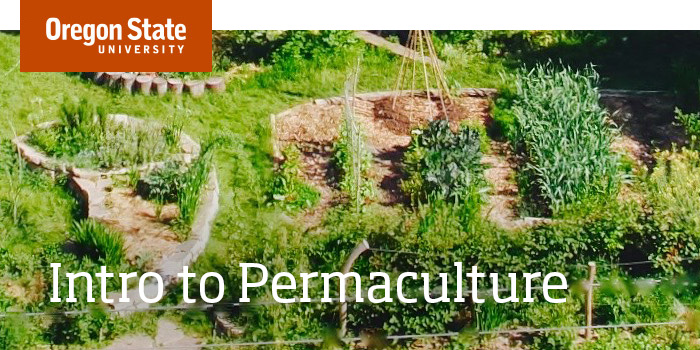What Is Permaculture?

Permaculture design is a method of landscape planning that can be applied to anything, from a home garden or farm to a city block or entire village. Permaculture uses design principles from nature itself and takes into account such things as how indigenous people use the land; how water, fire and wind flow through the land; and how soil, water, vegetation, buildings and habitats can be managed in a stable and enduring way.
The Permaculture perspective has more resonance now than at any other time since the term ‘Permaculture’ was coined in 1978. The Paris Climate Agreement has the world admitting it needs to turn civilization onto a different road. Permaculture design has been scouting out that path for nearly 40 years, and now it’s time that the world sees what we have learned about living in cooperation with nature.
That is why Oregon State University is launching a huge public education project with the creation of “Intro to Permaculture” — a Massive Open Online Course (MOOC) which runs from May 2 through May 27, 2016. This free course covers the foundations of the Permaculture design system in four weeks, with 12 to 16 hours of engagement.
OSU is throwing the full resources of its development staff at Open Oregon State to create a high-production, online educational experience that includes video, images, animation, text, resource lists, links, and interactive activities. When students complete all of the interactive assignments and content quizzes, they will receive a ‘digital badge’ which verifies their participation.
The course is taught by Andrew Millison, who has been involved in Permaculture practice, design and education for 20 years, and is an instructor in the Horticulture Department at OSU and founder of Permaculture Design International (PDI).
Global networking for mass education
We’re collaborating with the Permaculture Association, a British non-profit recognized as the most organized Permaculture organization on Earth. We’ll be using their extensive educational database and media assets in the course, and adding many of our own.
The goal is to use the resources that a major U.S. university can provide to present an organized introduction to the Permaculture design system, and steer people towards further study and practice of Permaculture, using the reach of our combined global network.
A host of other organizations have gotten on board to help publicize and provide educational and media resources, including Permaculture Design International, Regrarians, Oregon State University Small Farms, Unify, Daily Acts, Village Lab, NuMundo, Permaculture Voices, and more.
Who should take this course?
This course is for the novice and the professional alike, with no prior experience necessary. For the person new to design and land stewardship, the course will provide a foundation from which to build upon with subsequent training, and introduce a new perspective that can be applied in many careers and facets of life. The class assumes no prior knowledge.
For the gardener, farmer, nurseryman, architect, landscaper, land manager, developer, engineer, aid worker, planner or activist, this course can help to deepen and focus the good work you’re already doing, and provide a grounding in the Permaculture process that you can apply in your current endeavors. The course is not teaching specific techniques as much as a system and process of design which can be used to enhance work in many different fields.
Permaculture is a roadmap to sustainability
Our aim is to elevate Permaculture further into mainstream knowledge and discussions so this valuable design system can be used to transition civilization to a future with clean water, safe and abundant food, renewable energy and resources, healthy watersheds, and prosperous people and ecosystems.
There is a lot of social, political and environmental instability in the world right now. Consensus has been reached with the Paris Agreement that we need to drastically reduce carbon emissions to maintain a stable climate through this century and beyond. We need a paradigm shift where we change the foundation of business as usual. The Permaculture design system is a tool to accomplish this great shift, and it’s time we put that tool in everyone’s hands so we can all get to work repairing, restoring, regenerating, and reaping the rewards that will come when we care for Earth and its people.
Please accept this gift we are offering and share this opportunity for free Permaculture education with your family, friends, and community.
For more information, visit the course page.
Source: Andrew Millison, andrew.millison@oregonstate.edu
CATEGORIES: Academics Campus Sustainability Community Sustainability Natural Features and Landscaping
